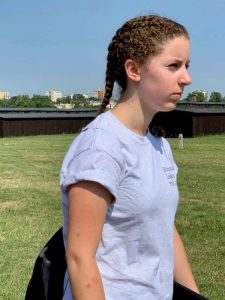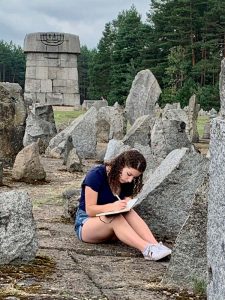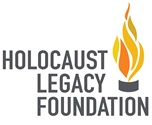Jillian Lederman
Marblehead, MA
Marblehead High School
 More than a Number
More than a Number
I originally learned about the Holocaust as a story of numbers. This many people died, this many survived, this many still live today… I didn’t see the problem with this form of education until I realized the dehumanizing power held within a number. Hundreds of thousands of Jews were stripped of their identities in Auschwitz-Birkenau and tattooed with a serial number that would effectively replace their names. Human beings were killed because the number of years they had been alive did not fall within the range of ages considered ‘suitable for work.’ In the concentration camps, prisoners were always lined up in fives, as though they were goods being arranged for sale. Just 80 years ago, millions of people were treated as nothing more than ‘units’ by members of a vile, depraved, morality-less ideology; and the world stood by and watched.
But the Holocaust was not a story of numbers. It was a story of stories. And before I was given the chance to travel to Poland and Germany to see for myself what remained of this horrific genocide, I never heard the stories. I never heard about Janusz Korczak, a director of an orphanage in Warsaw who could have saved himself when all his orphans were sent to Treblinka extermination camp, but who refused to let the children go alone. I never heard about the Ulma family, Christians who were executed for their efforts to rescue and hide Jews from the Nazis. I never heard about the 800 Jewish children who were separated from their parents and killed in an unmarked, mass grave in the middle of a forest. I never heard about the millions of my people who I only knew in numbers, all with only a fragment of a lifetime full of stories to tell.
 Over six million Jewish people died in the Holocaust. Six million . It’s an incomprehensible number, one that fails to capture the magnitude of the genocide it describes. Six million is the number I’ve known since childhood. But I know so much more now. I went to Poland and Germany. I left my footprints where it all happened. I heard the stories. I saw dusty shoes piled to the ceiling; I saw hundreds of abandoned combs and brushes; I saw articles of clothing echoing with the ghosts of those who used to wear them; I saw tiny bunk beds on which eight to twelve people slept at a time; I saw memorials; I saw human ash; I saw photographs; I saw barracks; and, most importantly, I saw stones from around the world, left in cemeteries, in gas chambers, in ghettos, and in concentration camps by a surviving Jewish population that never forgets.
Over six million Jewish people died in the Holocaust. Six million . It’s an incomprehensible number, one that fails to capture the magnitude of the genocide it describes. Six million is the number I’ve known since childhood. But I know so much more now. I went to Poland and Germany. I left my footprints where it all happened. I heard the stories. I saw dusty shoes piled to the ceiling; I saw hundreds of abandoned combs and brushes; I saw articles of clothing echoing with the ghosts of those who used to wear them; I saw tiny bunk beds on which eight to twelve people slept at a time; I saw memorials; I saw human ash; I saw photographs; I saw barracks; and, most importantly, I saw stones from around the world, left in cemeteries, in gas chambers, in ghettos, and in concentration camps by a surviving Jewish population that never forgets.
Numbers are not enough. Knowing that six million died is not enough. We’re alive. We have names, and personalities, and stories. We’re human. We feel the grief and relief and hurt and joy that are so intrinsically tied to our humanity. We’re not numbers. We’re not statistics. We’re not unmarked graves. And neither were they. But because they are not here to tell people “I was here. I have a name. This is what happened to me,” we must do it for them. We didn’t survive just to forget them. They are part of us, living in every one of our actions, trusting us to rehumanize them and to keep their stories alive. Let’s not betray that trust.
